
Brendan O’Neill 12 August 2017
Why are activists calling for the legalisation of same-sex marriage in Australia? To give gay people more choices in their lives? To expand freedom to a wider sweep of citizens? To complete the story of gay liberation that started in the late 1960s, when homosexuals sick of being harassed by cops and moral majoritarians fought back and demanded the right to be the masters of their own lives, loves and destinies?
I don’t think so. Such stirring, liberal cries for gay autonomy have been notable by their rarity in the same-sex marriage campaign. Rather, the more one listens to the key agitators for same-sex marriage, the more one must conclude that this is about propping up the apparently flagging self-esteem of the gay community, not deepening their freedom.
It looks increasingly like a campaign that infantilises rather than emancipates.
One that threatens to turn the clock back to when gay people were presumed to be morally insecure, mentally disarrayed, in need of help. And for that reason it isn’t only religious folk who should be sceptical about the campaign for same-sex marriage; so should those of us who are secularist, progressive and interested in moral independence.
The romantic narrative that has been attached to the successful campaign for gay marriage across the West is that it is the final piece in the gay liberation jigsaw a few brave souls started putting together five decades ago.
As powerful individuals and institutions lined up to cheer gay marriage — from Barack Obama to Britain’s Tories, from Morgan Stanley to Coca-Cola — we were told the ideal of gay liberation was finally near completion.
The fire started by the Stonewall rioters of 1969, when New York gays and drag queens pushed back against police repression and demanded the right to live as they saw fit, had spread everywhere.
But this doesn’t stack up. We live in an era hostile to the idea of liberation, sceptical that the individual should be sovereign over themselves.
Nanny staters tell us what to eat. Bureaucrats tut-tut over parenting styles. Pen-pushing officials myopically police where we can drink, when we can smoke, whether kids can set up lemonade stands. People are viewed as vulnerable, easily harmed by words, and needing permanent re-education to avoid being racist, misogynistic, eco-unfriendly scourges on the earth.
That the supposedly liberationist idea of gay marriage exploded in such an illiberal climate is curious, to say the least. It makes no sense.
Unless it isn’t about gay liberation. Unless it isn’t a liberal cause. Unless it’s the most celebrated idea among today’s illiberal chattering class because it has more in common with the freedom-taming outlook of the 21st century than with the liberty-yearning feel of the Stonewall 60s.
This is the truth about gay marriage: it symbolises not the completion of gay liberation but its end. It is a usurping of the Stonewall spirit. It represents the elbowing aside of that old politics of autonomy and its replacement by a new politics of therapy.
Penny Wong, in a long pro-same-sex marriage essay published last year, mentioned “freedom of choice” once.
The rest of her piece focused on the “health outcomes” of same-sex marriage; how it would positively affect people’s “welfare”. The present system was “hurtful and harmful”, she said, where “every engagement party, wedding invitation and marriage notice is a sharp reminder that some relationships count more than others”.
Wong echoes one of the key arguments for same-sex marriage. “Doctors lead call on Australia to legalise same-sex marriage”, said a Huffington Post headline in May, after the Australian Medical Association pleaded with parliament to push same-sex marriage through. They “lead” it — that is significant.
The AMA said holding off on same-sex marriage could have a “damaging impact on mental and physiological health outcomes”. Here, gay people are treated less as citizens deserving freedom than patients requiring mental assistance. It’s deeply patronising.
The Australian Psychological Society says same-sex marriage should be legalised to improve the “mental health and wellbeing” of gay people and their children.
In much of the media commentary, too, the cry has gone out that gay people won’t feel fully validated until a new marriage law is passed. Shorter version: they’re vulnerable and the powers that be must make them feel better.
This is the opposite of moral autonomy: it’s the cultivation of a new kind of moral dependence, where gays are presumed to require the care of the state. It’s about as far from Stonewall as you can get.
Witness the shockingly paternalistic arguments made against a plebiscite in recent days. “Australia’s leaders in mental health”, as one report called them, claim a public debate on gay marriage will unleash hatred and homophobia and this will be damaging to young gays in particular. Many columnists agree.
The case for same-sex marriage was similar in the US and Europe. Time and again the argument was made that this new institution would help make gay people feel confident, mentally grounded. As one writer said during Ireland’s referendum in 2015, legalising gay marriage was an act of “societal empathy”.
But is it really the role of the law to empathise with people? To make people feel good? I say no. The law should make us safe; but happiness is down to us and the exercise of our autonomy.
Making law a tool of empathy expands the law too far and reduces the individual to a childlike creature in need of moral care from on high.
Gay marriage is not gay liberation. Far from liberating gay people, it threatens to diminish them as individuals and make them existential slaves to the caring state, reliant on powerful people’s gracious recognition.
If you’re interested in gay liberation, or just liberation, you really should be sceptical about gay marriage.


